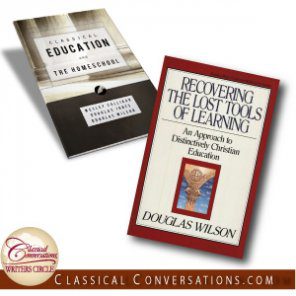After discussing the grammar stage of learning and mastering facts in part one of this article, let’s take a look at the next two stages of the trivium.
The second stage of the trivium is dialectic learning. By name, this clearly involves dialogue. Once a child has acquired the wealth of knowledge gained in the grammar stage they begin to want to talk about it. They want to ask a lot of “why” questions to understand how it fits together. Again, does this sound familiar? Preteen children, and adults for that matter, naturally become inquisitive with the acquisition of new knowledge and try to form relationships with it and other things they know. They begin to tie the pieces together, stringing one information peg to another, and they begin to make connections. This is where we “train the brain to understand.” In our home school we have many discussions with our growing children, training them to use reason and logic. We want them using critical thinking skills as they learn in both school and in life. We do not want them to blindly accept what others tell them—there are too many lies in the world. This dialectic phase is not quite as comfortable to us as parents, nor is it often seen in the public school system. There may be a small, select group of children that will be honed with these skills, but for the majority, their education stays at the grammar level of learning, even in high school. For us parents, it may seem daunting to begin these challenging conversations. I know sometimes my fear is that maybe I do not know all the reasons why or how things tie together, but part of the beauty of homeschooling is that we are learning together—right beside our children—and reclaiming our education at the same time.
In the third stage of the trivium, the rhetoric phase, the interrelation of subjects continues. No longer is math in one box, physics in another box, and history in another box. With a classical approach to homeschooling these subjects overlap each other and the relationship between them becomes prominently clear. We may study these as subjects, but through the process there is constant crossover from one to the other. Our world does not operate in separate subjects. Any career path that is chosen will utilize information and experience learned from many subjects cooperatively. The basis of the rhetorical phase is to use the understanding of interrelation of subjects and apply it to their life. A large part of this application involves effective communication. True wisdom is achieved when you can express or teach back what you have learned. Again, it may sound familiar to us that teens have a great desire to “express” themselves. It is natural for them to want to communicate with the world what is important to them. This stage is centered on effective communication, learning to speak and write effectively. “Train the brain to apply and persuade.” To truly hone their skills in a rhetorical environment, children must be with other children. They need to practice the skills of rhetoric, and dialectic sometimes, with other peers. This bumping up against each other is invaluable to test out the rhetorical process.
Children that have been educated with a classical approach will grow to be self educators, just like many of the great Founding Fathers of our country. They will not be afraid of learning something new because they will naturally see a clear path of mastering the grammar first, which will allow them to begin to ask questions to gain understanding, and eventually have the wisdom to apply it to their life. Think about it; isn’t this how you learn, too? Think how helpful it would be to adopt this approach in your home school with everything they learn. The classical model is a natural progression through education that seems to have been cut short in many schools today. The trivium is a lost set of tools we ought to rediscover and find priceless for our children and ourselves.
If you would like more information about classical education and particularly an option for homeschooling classically from kindergarten through high school you can go to classicalconversations.com and read about the Classical Conversations program. There are local groups in your area. Their website and catalog have many articles about classical education in general, too. A book I highly recommend which will give you a concise, yet complete, Christian view of classical education is Classical Education and the Homeschool by Wes Callihan and Doug Wilson. This is a quick read under seventy-five pages and it is also available in CD format. Doug Wilson also wrote a more comprehensive book called Recovering the Lost Tools of Learning that might be of interest to you.




